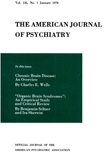REM sleep dreams and the activation-synthesis hypothesis
Abstract
The authors studied 104 dreams obtained from 14 subjects and quantified the formal aspects of the subjects' dream experiences by the following categories: movement in dreams, sensation, affect, dream bizarreness, and dream lucidity. Their results are compared with the predictions of the activation-synthesis hypothesis, which postulates that the characteristic formal aspects of dreams correspond to characteristic aspects of physiological activation during REM sleep. Although further experimental work is needed, the authors show that their results are consistent with and supportive of the activation-synthesis hypothesis.
Access content
To read the fulltext, please use one of the options below to sign in or purchase access.- Personal login
- Institutional Login
- Sign in via OpenAthens
- Register for access
-
Please login/register if you wish to pair your device and check access availability.
Not a subscriber?
PsychiatryOnline subscription options offer access to the DSM-5 library, books, journals, CME, and patient resources. This all-in-one virtual library provides psychiatrists and mental health professionals with key resources for diagnosis, treatment, research, and professional development.
Need more help? PsychiatryOnline Customer Service may be reached by emailing [email protected] or by calling 800-368-5777 (in the U.S.) or 703-907-7322 (outside the U.S.).



